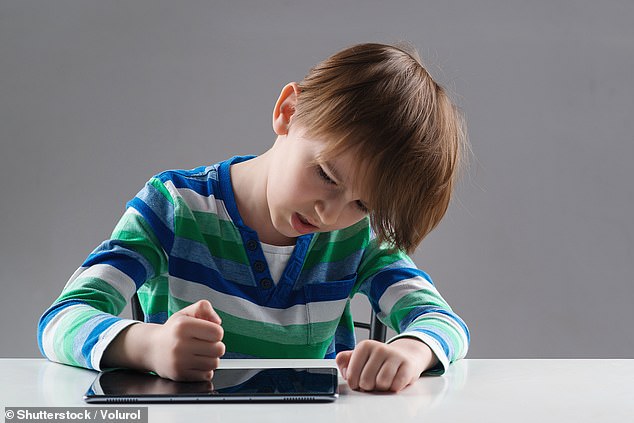Think twice before giving your child the iPad: Kids who use a tablet for an extra hour a day are 22% more likely to experience outbursts of ANGER, study finds
- Children who spend an extra hour a day on tablets are likely to be angrier a year later
- Tablet use may ‘contribute to a cycle that is damaging to emotional regulation’
Research shows that children who use their tablets for an hour longer per day are more likely to be angry or frustrated a year later.
Most parents have given their child a tablet at some point to keep him or her occupied or distract him or her from a tantrum.
But be warned: This could lead to problems later, experts say.
A team from the Université de Sherbrooke in Quebec asked 315 parents in Canada to track their child’s tablet use at ages 3.5, 4.5, and 5.5.
Parents were also asked to report their child’s expressions of anger and frustration at these ages.
Children who use their tablets for an hour longer per day are more likely to be angry or frustrated a year later, a study finds (stock image)
Overall, children in the sample spent an average of 6.5 hours per week – almost an hour per day – using tablets at age 3.5.
However, there was a wide variation between individual children: some did not use their tablet at all per day, while others used it for more than five hours per day.
Analysis found that every hour and fifteen minutes increase in tablet use per day at age 3.5 years was associated with a 22 percent increase in anger or frustration at age 4.5 years.
For example, think of a child who gets angry when it comes to bedtime, or throws a tantrum when it doesn’t get what it wants.

The researchers warn that tablet use in early childhood ‘may contribute to a cycle that is damaging to emotional regulation’ (stock image)
Children who were most angry or frustrated at age 4.5 were more likely to spend more time on tablets at age 5.5.
Writing in the journal Jama Pediatrics, the researchers warned that tablet use in early childhood “may contribute to a cycle that is damaging to emotional regulation.”
“At age 3, children can operate mobile devices independently,” the researchers said.
Parents reported that they often use screens to keep their children occupied while completing important tasks and chores.
‘This suggests that tablet use is often a solitary activity for children, and therefore offers few opportunities to learn and practice emotional regulation strategies.
‘In addition, recent research has shown that children’s use of electronic media contributes to less parent-child conversation, an important mechanism for children to learn self-regulation.’
Professor Caroline Fitzpatrick, one of the study’s authors, said: ‘Carers also report using tablets to calm children when they are experiencing strong emotions.
‘This strategy is likely to backfire in the long run, as it may hinder children’s ability to develop internal strategies to manage their emotions.
‘Parents of preschool-aged children should closely monitor and limit their child’s tablet use. Parents can also engage children in activities that help build emotional regulation skills, such as shared reading and imaginary play.’
However, Professor Chris Ferguson of Stetson University in Florida commented on the research, saying the findings “do not indicate a relationship where parents should be overly concerned about tablet use”.
